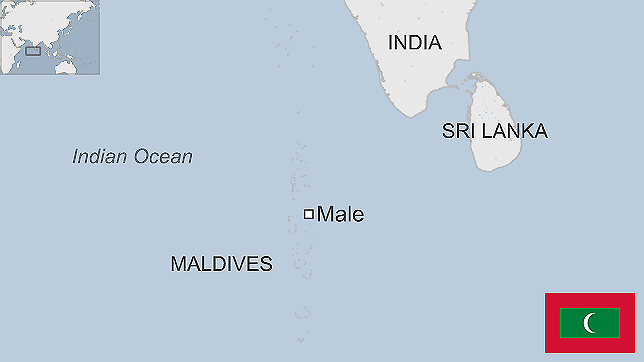Maldives presidential election re-run
- Published
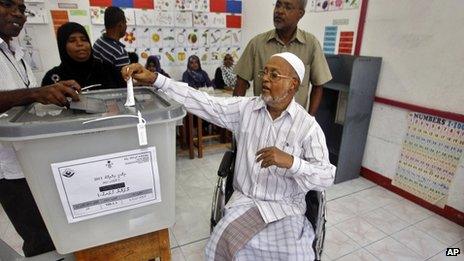
The vote held on 9 November was won by Mr Nasheed with 47% of the vote
The Maldives presidential election has been plagued with problems, causing polling to be rescheduled three times.
In the latest delay, the Supreme Court ordered the run-off planned for 10 November to be held on 16 November.
The Maldives has been in crisis since Mohamed Nasheed was forced to step down as president in 2012 under controversial circumstances which he described as a coup. Mr Nasheed was succeeded by then Vice-President Mohamed Waheed, who denies that a coup took place.
The Maldives saw its first free presidential elections in 2008. Before then it had been ruled for three decades by Maumoon Abdul Gayoom, who is still seen as wielding considerable political influence.
Continued instability in the tiny island nation has prompted fears about falling revenues from the vital tourism industry, which accounts for almost 30% of the country's GDP.
What is holding up choosing a leader?
The Supreme Court annulled a first vote on 7 September amid allegations of electoral fraud. A planned re-run on 19 October was halted and the election finally took place on 9 November.
However, a first attempt to hold a run-off the following day was cancelled hours before voting was due to begin. Police prevented election officials from distributing voting materials, citing a court order requiring all candidates to approve the voter register.
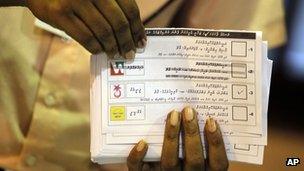
Ballot papers from the 9 November vote
The Maldives' Election Commission opposed the delay, worrying that a constitutional crisis could be created if the current president's term ended on 10 November without a decision about who would be the next president. But the Supreme Court said the incumbent President Waheed would stay on in the interim period.
Why was the first vote annulled?
Mohamed Nasheed won the 7 September polls with 45% of the vote. Abdulla Yameen, the half-brother of former ruler Maumoon Abdul Gayoom, came a distant second with 25%.
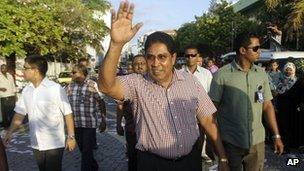
Gasim Ibrahim
In third place was prominent businessman Gasim Ibrahim with 24%, while the incumbent president, Mohamed Waheed, only polled 5%.
The Supreme Court put off the second round and then annulled the results from the first after Gasim Ibrahim complained of irregularities.
He alleged that problems with the electoral roll had allowed ineligible voters to cast their ballots. The court's verdict, supported by four of its seven judges, cited a confidential police report as confirming that more than 5,600 votes were ineligible and that some of them were cast in the name of dead people and underage children.
Local and international observers had described the first round of voting as free and fair.
Who is still in the running?
The new vote held on 9 November was won by Mr Nasheed with 47% of the vote, just short of the 50% needed to win outright. The second runner-up was Mr Yameen at 30%. Mr Ibrahim dropped out of the race after getting just 23% of the vote.
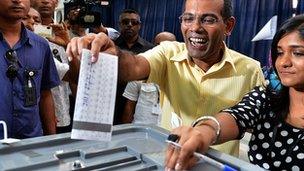
Mohamed Nasheed (2nd R) of the Maldivian Democratic Party (MDP)
Mr Nasheed leads the Maldivian Democratic Party (MDP), the single largest party with the highest number of registered members. He became the Maldives' first democratically elected president in 2008.
Mr Yameen is standing for the Progressive Party of Maldives (PPM), the second-largest party both inside and outside the parliament.
A runoff is scheduled for 16 November.
What are the key campaign issues?
Candidates have been largely focusing on religion, nationalism, economy and education in their election campaigns.
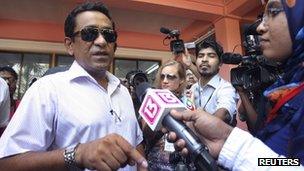
Abdulla Yameen of the Progressive Party of Maldives (PPM)
Tourism forms a large part of the Maldives' economy Mr Nasheed's party is focusing on economic development through reforms and tourism. His Maldivian Democratic Party's manifesto pledges tax reform, development projects and the setting up of a national development bank.
Mr Yameen has taken a strong position on law and order, campaigning in favour of implementing the death penalty and calling for harsher prison sentences.
Other candidates have used religion as a political tool to woo voters. Mr Ibrahim's manifesto proposed to strengthen Islam in the Maldives, including the establishment of an Islamic university and making the Koran a mandatory school subject. Mr Ibrahim also pledged to pursue oil exploration, increase taxes on the wealthy and provide laptops for students.
BBC Monitoring, external reports and analyses news from TV, radio, web and print media around the world. For more reports from BBC Monitoring, click here. You can follow BBC Monitoring on Twitter , externaland Facebook, external.
- Published10 November 2013
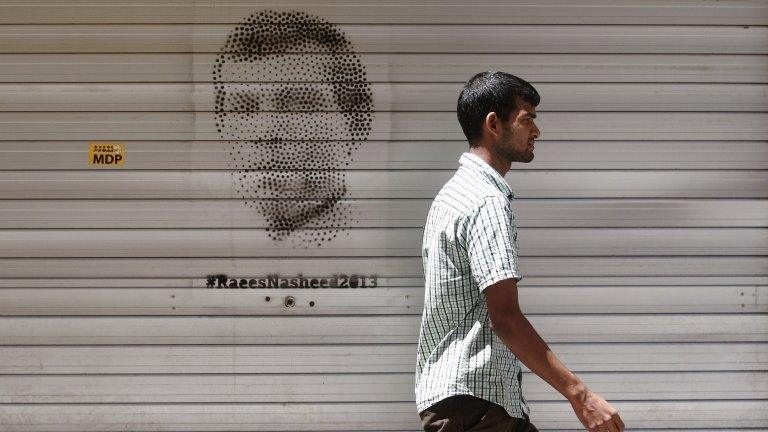
- Published9 November 2013
presidentialcandidatemohamednasheed.jpg)
- Published10 March
